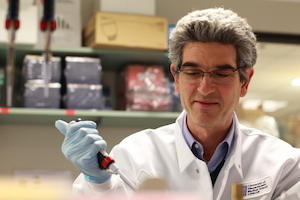
|
|
An article in Nature Medicine by Jeremy Luban, MD, the David J. Freelander Professor in AIDS Research and professor of molecular medicine and biochemistry & molecular pharmacology, entitled “The hidden cost of genetic resistance to HIV-1,” highlights the benefits of more diverse and higher resolution genetic databases, such as the UK Biobank, especially those that can be mapped with clinical metadata. As tools for genetic analysis become more powerful, it is critical for translational scientists to be better equipped to predict the full spectrum of consequences of given mutations, Dr. Luban said.
The need is illustrated by an accompanying study in which researchers at the University of California found a 21 percent increase in mortality rates among 400,000 individuals of British ancestry with a mutation in the C–C motif chemokine receptor 5 (CCR5). CCR5 is implicated in instances of HIV immunity, making the gene the focus of extensive research.
Scientists have long hypothesized that certain loss-of-function mutations to the CCR5 gene may be protective for HIV-1. This theory has garnered international attention over the last six months since a Chinese scientist claimed to have used the CRISPR gene editing system to randomly mutate the DNA of the CCR5 gene of twin babies during the in vitro fertilization process, with the hope of making them immune to HIV-1.
However, it is not clear what repercussions mutating the CCR5 gene may have for humans, much less if it will result in protection from HIV-1 infection. The California study suggests that the gene may shorten life span for this population.
“Beyond CCR5, the most important point raised by [this study] is that considerable risk comes with generating mutations in the genome of human beings, no matter how obvious the benefit that those mutations offer,” wrote Luban.